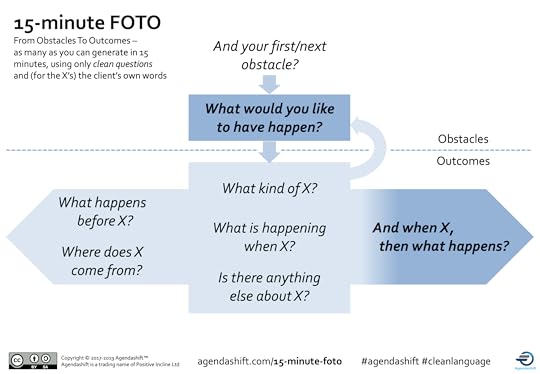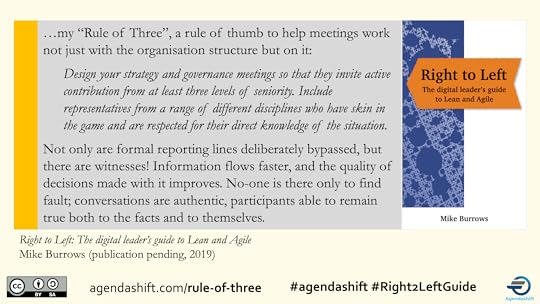Mike Burrows's Blog, page 32
April 16, 2019
More ‘Open’, and my first online workshops
I’m getting ready for a busy couple of weeks mid May:
Boston, May 14th & 15th: the Open Leadership Symposium in Boston
Boston, May 16th & 17th, the post-conference masterclass – a 2-day Advanced Agendashift workshop
Berlin, 22rd & 24th, Advanced Agendashift: Coaching and Leading Continuous Transformation
Partly in preparation and partly as housekeeping, I’ve updated the workshop page Advanced Agendashift: Coaching and Leading Continuous Transformation as follows:
Very much in the Open spirit of the Boston symposium, it now has a Creative Commons 4.0 CC-BY-SA license. That’s not quite the big deal that it might sound since the Overview pages that describe all Agendashift-based workshops have long had one, but it’s good to get that sorted.
Its structure now tallies with recent improvements. Day 1 is Learning the language of outcomes . Day 2 is Organising for impact , and it reflects the “rejigging” described in last week’s Notes from the April 2019 Advanced Agendashift workshop, London . I’ve updated the abovementioned Overview pages also.
As a spinoff from Boston (there’ll be discounts for attendees), from June I’ll be offering an online workshop, also titled Learning the language of outcomes. Presented as two 2-hour sessions on consecutive days it will be a great way to get up to speed quickly with outcome-orientation and Clean Language, getting some real practice in applying the latter to the former. At a minimum we’ll cover:
Celebration-5W
True North
15-minute FOTO
Plan on a page (so simple it doesn’t have a URL of its own but the 15-minute FOTO Dropbox does include a template)
Assessment/survey debrief
15-minute FOTO (trust me, it’s worth doing twice)
Officially, we launch these at the Symposium, but for a sneak preview (and early bird prices):
26-27 June, Online – two 2h sessions on consecutive days:
Learning the language of outcomes (two 2h online sessions)
16-17 July, Online – two 2h sessions on consecutive days:
Learning the language of outcomes (two 2h online sessions)
In person or online, I hope to see you soon!
Upcoming workshops – Boston, Berlin, Oslo, and Stockholm
16-17 May 2019, Boston, MA, USA:
Coaching and Leading Continuous Transformation
(Advanced, 2-day workshop)
22-23 May 2019, Berlin, Germany:
Coaching and Leading Continuous Transformation
(Advanced, 2-day workshop)
3-4 June 2019, Stockholm, Sweden:
Coaching and Leading Continuous Transformation
(Advanced, 2-day workshop, Mike Burrows and Kjell Tore Guttormsen )
6-7 June 2019, Oslo, Norway:
Coaching and Leading Continuous Transformation
(Advanced, 2-day workshop, Mike Burrows and Kjell Tore Guttormsen
Watch this space for Greece, Turkey, London, and the Benelux region in the autumn.
[image error]
Blog: Monthly roundups | Classic posts
Links: Home | About | Partners | Resources | Contact | Mike
Community: Slack | LinkedIn group | Twitter
We are champions and enablers of outcome-oriented change and continuous transformation. Building from agreement on outcomes, Agendashift facilitates rapid, experiment-based emergence of process, practice, and organisation. Instead of Lean and Agile by imposition – contradictory and ultimately self-defeating – we help you keep your business vision and transformation strategy aligned with and energised by a culture of meaningful participation. More…
April 8, 2019
Notes from the April 2019 Advanced Agendashift workshop, London
Fantastic 2-day Workshop by @asplake on @agendashift so much information, tools and most of all: coherence in applying tools and methods.
So intense that I will have quite some time to digest it all before trying to apply it to my work. pic.twitter.com/Ynp9HOfylO
— Jens-Chr. Fischer (@jcfischer) April 5, 2019
Thursday and Friday last week was the 2-day Advanced Agendashift workshop in London. The quick version of my takeaways (all confirmed by the retro stickies):
Mike Haber’s Celebration-5W template is a keeper
The beta version of the 15-minute FOTO cue card passes muster
My “Rule of Three” seems to resonate
Some rejigging
Excitement around “wholehearted”
Also, details of the next four of these workshops – Boston, Berlin, Oslo, and Stockholm.
Mike Haber’s Celebration-5W template is a keeper
Announced only a couple of weeks ago, I would definitely recommend using Mike Haber’s template – it makes the exercise easier for everyone involved, and the output vastly more presentable. I’ve updated the Celebration-5W page to make it more prominent.
The beta version of the 15-minute FOTO cue card passes muster
Also announced recently but previously untested, a beta version of the 15-minute FOTO cue card is now made official:
No-one missed the old “Is there a relationship between X and Y?” question (a question that comes with health warnings) and according to the retro sticky, the new question “Where does X come from?” rocks!
My “Rule of Three” seems to resonate
I mentioned my “Rule of Three” in answer to an important question about who should be invited to internal workshops. I had already written it up for my forthcoming book Right to Left but I was encouraged to put together a page for it with an easy-to-remember url, agendashift.com/rule-of-three.
After a few iterations on the text (helped by feedback in the #right-to-left channel in Slack), here’s the key quote:
Clicking on the image or the link above you’ll find a condensed, bullet point version, and some notes that hint at what’s to come in the book.
Some rejigging
Consolidating experiments described in Stringing it together with Reverse Wardley, The Cynefin Four Points exercise moves from day 1 to day 2, the launchpad for Mapping rather than the conclusion to Exploration. It allowed me to run “my slowest ever Discovery” on day 1, and nobody minded one bit.
Update: The name “Reverse Wardley” is (as we say in the UK) “a bit Marmite”, meaning that some loved it and others hated it. Is it “way too geeky”? This was already suspected, but I still don’t have a better alternative.
Excitement around “wholehearted”
Remember Towards the wholehearted organisation, outside in (May 2018)? For the evening of day 1, Steven Mackenzie (one of Right to Left‘s reviewers) suggested we held a “Lean Curry” around the topic. Here he is with his heart-shaped picture:
Post workshop day 1 Lean Curry – @busywait introducing #wholehearted, inspired by Christopher Alexander (of patterns fame) via an #agendashift blog post https://t.co/vOXU3omPWm #Right2LeftGuide #lean #agile pic.twitter.com/hwcAyogzFS
— Mike Burrows (@asplake) April 4, 2019
Before Right to Left is even published, perhaps a spinoff! Definitely one to watch.
Upcoming workshops – Boston, Berlin, Oslo, and Stockholm
16-17 May 2019, Boston, MA, USA:
Coaching and Leading Continuous Transformation
(Advanced, 2-day workshop)
22-23 May 2019, Berlin, Germany:
Coaching and Leading Continuous Transformation
(Advanced, 2-day workshop)
3-4 June 2019, Stockholm, Sweden:
Coaching and Leading Continuous Transformation
(Advanced, 2-day workshop, Mike Burrows and Kjell Tore Guttormsen )
6-7 June 2019, Oslo, Norway:
Coaching and Leading Continuous Transformation
(Advanced, 2-day workshop, Mike Burrows and Kjell Tore Guttormsen
Blog: Monthly roundups | Classic posts
Links: Home | About | Partners | Resources | Contact | Mike
Community: Slack | LinkedIn group | Twitter
We are champions and enablers of outcome-oriented change and continuous transformation. Building from agreement on outcomes, Agendashift facilitates rapid, experiment-based emergence of process, practice, and organisation. Instead of Lean and Agile by imposition – contradictory and ultimately self-defeating – we help you keep your business vision and transformation strategy aligned with and energised by a culture of meaningful participation. More…
March 29, 2019
Agendashift roundup, March 2019
In this shorter edition (I’ve been on holiday): London workshop; Looking ahead – Boston, Berlin, Stockholm, and Oslo; Right to Left; Top posts
London workshop
Thursday and Friday next week is the London workshop. A couple of entirely unavoidable dropouts means that there is still space if you want to come, but be quick as there’s the Agendashift delivery assessment to complete as prework. There are generous discounts available for public, education, and non-profit sectors and also for repeat attendees (not uncommon) – ping me for a code if you need one.
New this time:
A new template for Celebration-5W
Changes to the 15-minute FOTO cue card
Standardising the day 1 / day 2 split to accommodate the new string of mapping exercises
Looking ahead – Boston, Berlin, Stockholm, and Oslo
I can’t stress enough how much I’m looking forward to my trip to Boston in May – not just for the Agendashift masterclass (it’s called that to avoid confusion with shorter workshops held during the conference) but for the Open Leadership Symposium, which I believe will turn out to be a big deal.
On my return from Boston I’m off again to Berlin, for another 2-day workshop just 6 months since the last one. I’m grateful to my hosts Leanovate for their continued support! Looking ahead to early June, I’ll be doing Stockholm and Oslo with Agendashift partner Kjell Tore Guttormsen in one trip.
Right to Left
I have a well-reviewed and near-final draft now of Right to Left: The digital leader’s guide to Lean and Agile. Six chapters, 43,662 words, and I’m itching to get it out there! Behind the scenes I’m working on some spinoffs – more on those soon!
Top posts
Why the Open Leadership Symposium is a big deal
Stringing it together with Reverse Wardley (February)
Testing some changes to the 15-minute FOTO cue card
My favourite Clean Language question (January)
A new template for Celebration-5W
Blog: Monthly roundups | Classic posts
Links: Home | About | Partners | Resources | Contact | Mike
Community: Slack | LinkedIn group | Twitter
We are champions and enablers of outcome-oriented change and continuous transformation. Building from agreement on outcomes, Agendashift facilitates rapid, experiment-based emergence of process, practice, and organisation. Instead of Lean and Agile by imposition – contradictory and ultimately self-defeating – we help you keep your business vision and transformation strategy aligned with and energised by a culture of meaningful participation. More…
March 19, 2019
A new template for Celebration-5W
Nicely following on from my post a few days ago on ‘Open‘, here’s a community-driven enhancement to our Creative Commons-licensed workshop kickoff exercise, Celebration-5W, in which participants capture the ‘Who, What, When, Where, and Why’ (the journalistic 5Ws) of a celebration that will take place some months from now. I use it to capture or create some shared context not just for classic Agendashift workshops, but also for my ‘outside-in’ strategy workshops (more on those coming soon in Right to Left), where a sense of timescale is very helpful.
Mike Haber took my “Clean sheet of A3, portrait mode, big bold headings down the page” and came up with something significantly better:
Celebration 5W tabletop Capture Sheet for the @GraphicChange course I'm doing using Agendashift Celebration 5W workshop from @asplake#agendashift pic.twitter.com/qp1604UFC6
— Mike Haber (@michaelthaber) March 12, 2019
This is great, and not just because it looks good – it’s really clever!
The original guidance as described in the deck and in chapter 1 of the book suggests that you start with ‘When’ (How long will we need to achieve something meaningful?) and work backwards through the ‘What’ and the ‘Who’ before finishing up with the ‘Where’ (a venue that makes some kind of statement) and the ‘Why’ (the importance of not just the celebration but the whole endeavour). With Mike’s layout, this translates to “Start with the When (bottom right) and work anticlockwise” – much more elegant! For presentation purposes, it’s natural to start either top left with the ‘Who’ and work clockwise or left-right, or in the visually impactful middle with the ‘Why’.
The Celebration-5W Dropbox now includes an updated facilitation deck with instructions for both old and new layouts, also a printable template (I just bought myself an A3 printer with very much this kind of thing in mind). Request access here.
I will of course be using this new template in my upcoming workshops; Julia might too. Check out details of events in Seattle, London, Boston, Berlin, Stockholm, and Oslo below.
Upcoming Agendashift workshops
See also the recent blog post: Agendashift workshops in Seattle, London, Boston, and Berlin, which includes a detailed description of the 2-day workshop. Workshops facilitated by Mike Burrows (yours truly) unless otherwise indicated:
29 March 2019, Seattle, WA, USA:
Facilitating Outcome-Oriented Change with Agendashift
(Core, 1-day workshop, Julia Wester )
4-5 April 2019, London, UK
Coaching and Leading Continuous Transformation
(Advanced, 2-day workshop)
16-17 May 2019, Boston, MA, USA:
Coaching and Leading Continuous Transformation
(Advanced, 2-day workshop)
22-23 May 2019, Berlin, Germany:
Coaching and Leading Continuous Transformation
(Advanced, 2-day workshop)
3-4 June 2019, Stockholm, Sweden:
Coaching and Leading Continuous Transformation
(Advanced, 2-day workshop, Mike Burrows and Kjell Tore Guttormsen )
6-7 June 2019, Oslo, Norway:
Coaching and Leading Continuous Transformation
(Advanced, 2-day workshop, Mike Burrows and Kjell Tore Guttormsen
Blog: Monthly roundups | Classic posts
Links: Home | About | Partners | Resources | Contact | Mike
Community: Slack | LinkedIn group | Twitter
We are champions and enablers of outcome-oriented change and continuous transformation. Building from agreement on outcomes, Agendashift facilitates rapid, experiment-based emergence of process, practice, and organisation. Instead of Lean and Agile by imposition – contradictory and ultimately self-defeating – we help you keep your business vision and transformation strategy aligned with and energised by a culture of meaningful participation. More…
March 8, 2019
Why the Open Leadership Symposium is a big deal
I’ve mentioned in previous posts that I’ll be speaking and facilitating at the Open Leadership Symposium in Boston on May 14th-15th and leading a masterclass (a 2-day Agendashift workshop) afterwards. If you’re wondering what the fuss is all about, here’s my personal take on something very exciting that is still in the process of emerging, for which the conference represents an important milestone.
Behind the scenes, the conference organisers and some like-minded contributors have been going back to basics, challenging even what we mean by “Open”, let alone the “Open Leadership” after which the conference is named. Along the way, Niels Pflaeging dropped in the the term “Open Social Technologies” and it got me wondering:
What that might term mean for Agendashift and similar frameworks, and
How that differentiates us from the less open (and non-open) incumbents
So, with inspiration from Niels, Heidi Araya, Daniel Mezick, and others, here’s my take, very lightly adapted from a passage I’ve already included in the draft of my forthcoming book [1]:
[Relative to the branded Agile process frameworks, the term] Open Social Technologies represents a much broader, more diverse, and still complementary array of frameworks that address a range of organisational concerns in ways that the process frameworks simply cannot.
They’re open in multiple ways:
Not only are they well documented, they share substantial parts through open source, Creative Commons, and similar mechanisms (including release into the public domain), to the extent that a suitably-experienced practitioner could with effort reproduce and even improve on it, without necessarily licencing whatever conveniences might be available to them on a commercial basis.
They’re open not just to extension (a natural property of any framework) but also to modification and replacement, something that many branded frameworks actively discourage. To be truly open, there must be no mandated practices; instead an attitude of “core or better” [2] prevails, enabling both local adaptation and community-driven innovation.
They are non-exclusive; they combine in multiple, interesting, and exciting ways, the composition often greater than the sum of the parts
They are highly sensitive to context, portable from one social or organisational context to another, producing perhaps radically different outputs according to the situation. To achieve this, they’re generative, such that outputs are generated, organised, prioritised, and developed by participants – predetermined neither by the framework nor the facilitator.As social tools, they help people to work together, empowering them with decision-making authority, building social capital up, down, and across the organisation and beyond its four walls. This describes both how they work when they’re being used deliberately and the kind of organisational legacy they tend to leave behind. For the engagement models in particular, this internal consistency is an explicit design goal, one that contrasts sharply with the dissonance and disengagement too easily triggered by traditional approaches to change.
A small selection of relevant frameworks that demonstrate all of these properties:
The engagement models [3] Agendashift [4] and OpenSpace Agility [5]
Clean Language [6], which via Agendashift or on its own is valued by parts of the Lean-Agile community as a coaching protocol. Its heritage however is in psychotherapy – a powerful demonstration of the portability and sensitivity to context described in point 3 above!
The large-scale collaboration framework Open Space Technology [7]
The conference brings representatives of these frameworks (and more) under one roof for the first time, and that is surely cause for excitement. We have a programme not just of talks but hands-on workshops also, not to mention the pre- and post-conference masterclasses of which mine is just one. Who knows what might happen? To be honest, I don’t think anyone can be sure, which makes it an event not to be missed.
Further information about the conference can be found here; sign up to the masterclasses here. See you there!
References
[1] Right to Left: The digital leader’s guide to Lean and Agile (due by midsummer 2019)
[2] See the blog post “Core or better”
[3] See agendashift.com/engagement-model
[4] See the site agendashift.com and the book Agendashift: Outcome-oriented change and continuous transformation (New Generation Press, 2018)
engagement model
[5] See the site openspaceagility.com and the The OpenSpace Agility Handbook, Daniel Mezick, Mark Sheffield, Deborah Pontes, Harold Shinsato, Louise Kold-Taylor, and Mark Sheffield (Freestanding Press, edition 2.2, 2015)
[6] See en.wikipedia.org/wiki/Clean_Language and for Agendashift’s application of it, the coaching game 15-minute FOTO
[7] Open Space Technology: A User’s Guide, Harrison Owen (Berrett-Koehler Publishers, 3rd edition, 2008)
Upcoming Agendashift workshops
See also the recent blog post: Agendashift workshops in Seattle, London, Boston, and Berlin, which includes a detailed description of the 2-day workshop. Workshops facilitated by Mike Burrows (yours truly) unless otherwise indicated:
29 March 2019, Seattle, WA, USA:
Facilitating Outcome-Oriented Change with Agendashift
(Core, 1-day workshop, Julia Wester )
4-5 April 2019, London, UK
Coaching and Leading Continuous Transformation
(Advanced, 2-day workshop)
16-17 May 2019, Boston, MA, USA:
Coaching and Leading Continuous Transformation
(Advanced, 2-day workshop)
22-23 May 2019, Berlin, Germany:
Coaching and Leading Continuous Transformation
(Advanced, 2-day workshop)
3-4 June 2019, Stockholm, Sweden:
Coaching and Leading Continuous Transformation
(Advanced, 2-day workshop, Mike Burrows and Kjell Tore Guttormsen )
6-7 June 2019, Oslo, Norway:
Coaching and Leading Continuous Transformation
(Advanced, 2-day workshop, Mike Burrows and Kjell Tore Guttormsen
Blog: Monthly roundups | Classic posts
Links: Home | About | Partners | Resources | Contact | Mike
Community: Slack | LinkedIn group | Twitter
We are champions and enablers of outcome-oriented change and continuous transformation. Building from agreement on outcomes, Agendashift facilitates rapid, experiment-based emergence of process, practice, and organisation. Instead of Lean and Agile by imposition – contradictory and ultimately self-defeating – we help you keep your business vision and transformation strategy aligned with and energised by a culture of meaningful participation. More…
March 7, 2019
Testing some changes to the 15-minute FOTO cue card
Subscribers to the 15-minute FOTO Dropbox may have noticed a new ‘ v12 BETA’ version of the cue card. 15-minute FOTO is our Clean Language-inspired coaching game, and we’ll be testing this version – twice! – at the London workshop early next month (and while we’re here, note that early bird pricing expires tomorrow).
[image error]
Changes:
Dropped the question “Is there a relationship between X and Y”. Quite simply, this question was more trouble than it was worth. That it needed health warnings was already a strong indication that it should go, and learning that this question seems to have few defenders among expert Clean Language users clinched it for me.
Added “Where does X come from?” as an alternative to “What happens before X?”. I’m taking advantage of the space relinquished by the first change to add a question that I find useful. You can use it to follow system flows upstream (from Right to Left , so to speak), and also to explore abstract outcomes – “Where does that collaboration come from?”, for example (see also My favourite Clean Language question ).
The two questions “What would you like to have happen?” and “And when X, then what happens” are highlighted more clearly than before. In the game, when presented with (respectively) an obstacle or an outcome, these are the default questions to use, the former to ‘flip’ obstacles to outcomes and the latter to generate more outcomes, going deeper into outcome space.
Additional visual cues: a boundary between the obstacle and outcome ‘spaces’, along with a reminder (the curved arrow) to use the WWYLTHH question in the event that the conversations lingers unproductively inside obstacle space.
For the time being, you can download a PDF here. For the source pptx file, the facilitator’s deck, and for continued updates, subscribe here. You’ll find a video there too.
Upcoming Agendashift workshops
See also the recent blog post: Agendashift workshops in Seattle, London, Boston, and Berlin, which includes a detailed description of the 2-day workshop. Workshops facilitated by Mike Burrows (yours truly) unless otherwise indicated:
29 March 2019, Seattle, WA, USA:
Facilitating Outcome-Oriented Change with Agendashift
(Core, 1-day workshop, Julia Wester )
4-5 April 2019, London, UK
Coaching and Leading Continuous Transformation
(Advanced, 2-day workshop)
16-17 May 2019, Boston, MA, USA:
Coaching and Leading Continuous Transformation
(Advanced, 2-day workshop)
22-23 May 2019, Berlin, Germany:
Coaching and Leading Continuous Transformation
(Advanced, 2-day workshop)
3-4 June 2019, Stockholm, Sweden:
Coaching and Leading Continuous Transformation
(Advanced, 2-day workshop, Mike Burrows and Kjell Tore Guttormsen )
6-7 June 2019, Oslo, Norway:
Coaching and Leading Continuous Transformation
(Advanced, 2-day workshop, Mike Burrows and Kjell Tore Guttormsen
[image error]Blog: Monthly roundups | Classic posts
Links: Home | About | Partners | Resources | Contact | Mike
Community: Slack | LinkedIn group | Twitter
We are champions and enablers of outcome-oriented change and continuous transformation. Building from agreement on outcomes, Agendashift facilitates rapid, experiment-based emergence of process, practice, and organisation. Instead of Lean and Agile by imposition – contradictory and ultimately self-defeating – we help you keep your business vision and transformation strategy aligned with and energised by a culture of meaningful participation. More…
February 28, 2019
Agendashift roundup, February 2019
In this edition: Right to Left; Reverse Wardley; Coaching Agile Journeys; The Open Leadership Symposium; Top posts; Upcoming Agendashift workshops
Right to Left
Exciting news: as of last night I have a complete draft of my third book, Right to Left: The digital leader’s guide to Lean and Agile. Not that “complete” means “finished” – as the old joke goes it’s more like 95% complete with only the remaining 50% left to do. For the record, it comes out at 40,685 words – just a tiny bit longer than Agendashift and way less than KFTI.
I’m not giving publication dates yet (in fact I’m still exploring publication options) but my original target of midsummer still looks very doable. Also, I’ve consciously written it with the possibility of releasing it as an audiobook, which would be a first for me.
Reverse Wardley
An amazing response to this month’s top post, Stringing it together with Reverse Wardley, pushing My favourite Clean Language question into second place for the year.
For the 2-day workshop, introducing the new exercise as part of a “string” of exercises – one feeding quickly into the next – has caused me to push one exercise from day 1 to day 2, improving the balance of the two days overall. To experience that for yourself, check out the calendar later in this post.
Coaching Agile Journeys
Check out episode CAJ 032 of the Coaching Agile Journeys webinar. You’ll find there a YouTube video hosted by Heidi Araya and Cristin Hernandez, and then me:
Introducing the topic of outcome orientation
Facilitating an online exercise
Mentioning some of the tools we use to turn outcomes into concrete action
Describing how needs-based and outcome-oriented approaches work in both change and delivery (the connection between Agendashift and Right to Left)
Answering some questions!
The Open Leadership Symposium
At the end of that webinar there’s a plug for the Open Leadership Symposium event happening in Boston in May (my Boston workshop follows immediately afterwards). I’m very excited about this event, a lot of streams coming together. More on that soon no doubt!
Top posts
Stringing it together with Reverse Wardley
My favourite Clean Language question (January)
On the quality and nature of backlogs
How the Leader-Leader model turns Commander’s Intent upside down (June 2018)
‘Right to Left’ works for Scrum too (July 2018)
Upcoming Agendashift workshops
See also the recent blog post: Agendashift workshops in Seattle, London, Boston, and Berlin, which includes a detailed description of the 2-day workshop. Workshops facilitated by Mike Burrows (yours truly) unless otherwise indicated:
29 March 2019, Seattle, WA, USA:
Facilitating Outcome-Oriented Change with Agendashift
(Core, 1-day workshop, Julia Wester )
4-5 April 2019, London, UK
Coaching and Leading Continuous Transformation
(Advanced, 2-day workshop)
16-17 May 2019, Boston, MA, USA:
Coaching and Leading Continuous Transformation
(Advanced, 2-day workshop)
22-23 May 2019, Berlin, Germany:
Coaching and Leading Continuous Transformation
(Advanced, 2-day workshop)
3-4 June 2019, Stockholm, Sweden:
Coaching and Leading Continuous Transformation
(Advanced, 2-day workshop, Mike Burrows and Kjell Tore Guttormsen )
6-7 June 2019, Oslo, Norway:
Coaching and Leading Continuous Transformation
(Advanced, 2-day workshop, Mike Burrows and Kjell Tore Guttormsen
[image error]Blog: Monthly roundups | Classic posts
Links: Home | About | Partners | Resources | Contact | Mike
Community: Slack | LinkedIn group | Twitter
We are champions and enablers of outcome-oriented change and continuous transformation. Building from agreement on outcomes, Agendashift facilitates rapid, experiment-based emergence of process, practice, and organisation. Instead of Lean and Agile by imposition – contradictory and ultimately self-defeating – we help you keep your business vision and transformation strategy aligned with and energised by a culture of meaningful participation. More…
February 18, 2019
On the quality and nature of backlogs
From the Agendashift and Agile and Lean Software Development LinkedIn groups (the second by request):
If you’re building systems for use by humans, ploughing through backlogs of requirements – however well they might be written – rarely delivers anything better than mediocrity. Conversely, in a high feedback environment (where ideas get tested very quickly), even apparently low-quality inputs can deliver great results, if the inputs do at least focus collaboration and innovation on the right challenges.
Not that the “upstream” folks get a free ride from me – it’s their job to ensure a ready supply of those right challenges to work on, options developed to an appropriate level of detail just-in-time. What’s “appropriate” here is highly contextual, depending as it does on the degree of uncertainty involved and the skillset of the team. Focussing on the quality of the backlog as a whole would be a mistake and not a metric I would want anyone to take seriously.
That’s taken a little out of context and there is no doubt a risk that I’ll be misunderstood, but the comment stands alone well enough I think. One thing is for sure: I completely stand by the idea that ploughing through backlogs is a recipe for mediocrity, particularly when the system under construction is mainly for use by real people. I said it before in Agendashift and I’ll be saying it again (albeit for a different audience) it in Right to Left.
As to the idea that focussing too much on the quality of the backlog can be a trap for the unwary, let me quote from the draft of Right to Left. Here we’re describing close collaboration between development and its ‘upstream’ process in a digital context where this kind of working is now very well proven:
[They] learned to stop thinking of [their ‘upstream’ process] as a phase broken down into stages with gates in between; now they understand it as managing a portfolio of options for the best possible return. The best ideas will be released quickly, perhaps even before they are fully formed – the opportunity being great enough that more eyes and hands should be involved sooner. Some ideas take longer to mature, the cost/benefit equation being sufficiently marginal that a few rounds of prototyping and user testing might save the team some wasted effort later. The least promising ideas will languish for a while before a positive decision is made to reject them. No-one mourns a rejected option; each one is a bullet dodged, waste avoided.
Focus less on the backlog itself and more on the job that it has to do!
Upcoming Agendashift workshops
See recent blog post: Agendashift workshops in Seattle, London, Boston, and Berlin
Facilitated by Mike Burrows unless otherwise indicated:
29 March 2019, Seattle, WA, USA:
Facilitating Outcome-Oriented Change with Agendashift
(Core, 1-day workshop, Julia Wester )
4-5 April 2019, London, UK
Coaching and Leading Continuous Transformation
(Advanced, 2-day workshop)
16-17 May 2019, Boston, MA, USA:
Coaching and Leading Continuous Transformation
(Advanced, 2-day workshop)
22-23 May 2019, Berlin, Germany:
Coaching and Leading Continuous Transformation
(Advanced, 2-day workshop)
[image error]Blog: Monthly roundups | Classic posts
Links: Home | About | Partners | Resources | Contact | Mike
Community: Slack | LinkedIn group | Twitter
We are champions and enablers of outcome-oriented change and continuous transformation. Building from agreement on outcomes, Agendashift facilitates rapid, experiment-based emergence of process, practice, and organisation. Instead of Lean and Agile by imposition – contradictory and ultimately self-defeating – we help you keep your business vision and transformation strategy aligned with and energised by a culture of meaningful participation. More…
February 15, 2019
Agendashift workshops in Seattle, London, Boston, and Berlin
With two new dates recently added to the calendar I’m taking the opportunity to share what’s currently available, with workshops in Seattle, London, Boston, and Berlin. Dates for Norway, Sweden, the Netherlands, and Greece will be published soon.
First up, in late March, Julia Wester is holding a Core, 1-day workshop in Seattle, WA, USA. To my knowledge this is the first public Agendashift workshop to be held in the Pacific Northwest:
29 March 2019, Seattle, WA, USA:
Facilitating Outcome-Oriented Change with Agendashift
(Core, 1-day workshop)
Soon after (in early April) and added to calendar only this week, I’m holding a 2-day, Advanced workshop in London. Note that Advanced doesn’t mean “more complicated” or “for experts only”! Rather, it has more space and depth – for better experience if you can make the time for it – and it includes all the Core exercises. At the end of this post I’ve included the workshop description so you can easily check it out for yourself.
4-5 April 2019, London, UK
Coaching and Leading Continuous Transformation
(Advanced, 2-day workshop)
On the 14th & 15th May I’ll be speaking and facilitating at the Open Leadership Symposium in Boston, a very exciting development that I’ll be writing about soon. Immediately afterwards, the Advanced workshop will be one of a selection of post-conference masterclasses:
16-17 May 2019, Boston, MA, USA:
Coaching and Leading Continuous Transformation
(Advanced, 2-day workshop)
Finally, the week after Boston after I’ll be back with my friends at Leanovate in Berlin for what is becoming a regular fixture:
22-23 May 2019, Berlin, Germany:
Coaching and Leading Continuous Transformation
(Advanced, 2-day workshop)
Overview of the 2-day Advanced workshop (taken from the London workshop)
“Looking back to the Agendashift session a few weeks ago, it has been incredibly helpful to me in my professional development”
“What stood out for me was how the participants started to develop a shared ownership of organisational change through shared outcomes and values. It managed to align even a bunch of strangers”
Expanding on (and including) the core Agendashift workshop Facilitating Outcome-Oriented Change, this 2-day workshop is aimed at coaches, consultants, and managers wishing to:
Develop their coaching and leadership skills in the areas of enquiry, facilitation, strategy deployment, and change leadership
Broaden and deepen their appreciation of the Lean-Agile landscape and related bodies of knowledge and their strategic application to organisational development
Who should attend?
The advanced workshop is aimed at agents and leaders of organisational change – whether internal or external, specialist practitioner, or sponsor. Whilst the majority of attendees have been coaches and consultants, a significant number have held managerial and business leadership roles .
Public workshops are focussed primarily on skills. You will however have ample opportunity to put them into your organisational context and demonstrate Agendashift’s ability to meet organisational needs in ways such as these:
Launching, refocusing, or re-energising continuous transformation in your organisation
Enhancing your organisation’s internal coaching and change management capability
Embedding outcome-orientation and continuous transformation through leadership development
Participants will receive a print copy of the book Agendashift: Outcome-oriented change and continuous transformation
Overview
[image error]
Day 1: Learning the language of outcomes
Discovery: Describing where we would like to get to
Exploring organisational context, objectives, obstacles, and outcomes
Celebration-5W and our Clean Language-inspired coaching game 15-minute FOTO
Plan on a page
Culture, values, and Systems Thinking
Exploration: Prospecting for opportunities
Mission, purpose, and identity
Self-awareness and empathy
Debriefing your Agendashift delivery assessment (set as prework, sent out a week in advance)
Generating outcomes
Understanding and supporting the learning process
Day 2: Structuring the response
Mapping: Building a visual transformation plan
Multiple tools and models for transformation mapping – Cynefin, (Reverse) Wardley Mapping , User Story Mapping
Strategy model reconciliations
Other mapping tools
Elaboration: Framing actions, testing our thinking
& Operation: Change as real work
Changeban : a Lean Startup flavoured variant of Featureban, our popular simulation game
Creating options, framing hypotheses, developing experiments with A3
Cross-checking your experiment design
Authenticity: stories, requirements, and needs
Outcomes
Practice in a range of outcome-centric facilitation techniques
Recognition of the role of outcome orientation in the modern organisation
Understanding of the integration of techniques and concepts from Lean-Agile, Kanban, Clean Language, Cynefin, Lean Startup, and A3.
Awareness of the power of feedback loops in organisational behaviour and evolution
Discounts
Current members of the Agendashift partner programme and attendees of previous Agendashift workshops are eligible to a £50 discount. Attendance at this workshop qualifies new partners to the same discount off their first year membership. We are also happy to offer discounts to employees in the public, educational, and charitable/non-profit sectors. Please email support@agendashift.com for details and discount codes.
About us
Your facilitator will be Agendashift founder Mike Burrows. Mike is the author of Kanban from the Inside (2014) and Agendashift: Outcome-oriented change and continuous transformation (2018); his third book Right to Left: The digital leader’s guide to Lean and Agile is due in 2019. Mike is known for Kanban’s values model, the Featureban and Changeban games, and as a strong advocate for participatory and outcome-oriented approaches to change, transformation, and strategy. Prior to his consulting career, Mike was global development manager and Executive Director at a top tier investment bank, and CTO for an energy risk management startup.
About Agendashift | Resources | Slack | LinkedIn
February 12, 2019
Stringing it together with Reverse Wardley
A few weeks ago in #workshops in the Agendashift Slack, Karl Scotland posted this:
Liz and I have just figured out how to use Wardley Mapping to create the Transformation Map. Muwahahaha.
The basic idea is to take the FOTO outcomes that get used in 4-Points, and re-use them in a Wardley Map, so the Transformation Map is more of a Wardley Map than a Story Map.
Vertical axis is “distance” from the customer.
Horizontal axis is ambiguity of solution (which may or may not relate to the Cynefin domains)
As things turned out, I was the first to get the opportunity try an exercise that (for want of a better name) I’m calling Reverse Wardley. I’ve done it twice now, and it has gone down so well that not just this exercise but the string of exercises I’ll describe in a moment look set to be a fixture at future 2-day Agendashift workshops (and shorter ones, time permitting). If ever there’s a 2nd edition of the Agendashift book, expect to see it written up there!
First though, let me decode some of Karl’s shorthand:
Liz is Liz Keogh
Wardley Mapping is a strategy tool developed and open sourced by Simon Wardley . There’s a great description here .
Transformation Map refers to the output of Agendashift’s Mapping activity, which by default looks like a User Story Map, but only superficially, since the column names don’t really describe a user journey and the items in the columns are outcomes, not user stories
FOTO is short for 15-minute FOTO , our Clean Language-inspired coaching game; FOTO outcomes means the outcomes generated through the game
Taking care not to mention it by name until afterwards (it would rather ruin the experience), we use the Cynefin 4 Points Contextualisation exercise to do a preliminary organisation of outcomes and thereby identify those outcomes most suited to an iterative and hypothesis-based approach (as opposed more linear, plan-based or “just do it” approaches, say)
So, with full credit to Liz and Karl (and indirectly to Simon Wardley and Dave Snowden on whose work this all depends), here’s the string of exercises with photos from two recent workshops, one a public workshop in Gurugram, India (before Agile Gurugram 2019), the other a private workshop for delivery managers at the UK government’s Department for Work and Pensions (DWP) in Leeds.
First, the outcomes generated in 15-minute FOTO are transferred onto stickies and organised Cynefin-style (as described at some length in chapter 2 of the Agendashift book):


Stickies are then moved/projected onto an “x-axis of ambiguity” – “Ambiguous” outcomes with multiple and/or unknown solutions towards the left, “Clear” (obvious or best practice) outcomes towards the right:



Next, we introduce a y-axis, moving stickies upwards according to their visibility to the customer/user. We did this silently, noting that some stickies were the focus of some silent debate that we replayed out loud afterwards (it turns out that vertical placement can be surprisingly but interestingly controversial):



Without much in the way of prompting from me, it is apparent to everyone at this stage that:
The topmost stickies are our headline or thematic outcomes
Stickies lower down tend to support those headline items; had we been working on a whiteboard we might have drawn some dependency lines to make it look more like a real Wardley Map
Any low-level stickies that don’t obviously support anything else might be culled
To be clear, this isn’t a Wardley Map. A Wardley Map is anchored at the top on a user need, the value chain drawn below it (dependencies below, value flowing upwards), and the x-axis segmented into zones corresponding to product life cycle stages that don’t quite apply here (or that at least would take an unnecessary amount of explaining). We could perhaps have abstracted a top level user need from the headline items (but didn’t), and in any case, the items below don’t really constitute a value chain. Process-wise, it’s in reverse with respect to Warley Mapping, because it’s done bottom-up instead of customer-first, and x-axis before y.
Finally, we move the stickies yet again onto a third map, this time the story map(ish) representation. The trick here builds on one blogged previously: stickies from the bottom and the right of the Reverse Wardley representation go onto the story map first, the quick wins most likely being here. The thematic, headline items get transferred last, and go “above the line” on the story map if they might replace the original column names (their own being preferable to anything facilitator-provided):

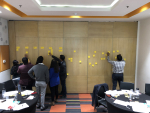
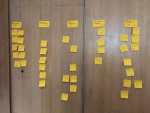
You might be wondering whether all this organising and re-organising of stickies is worth it, but here’s just a sample of the feedback, representative of both workshops:

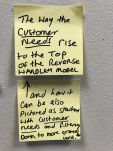

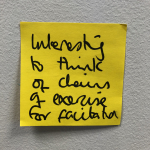
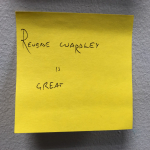
Here’s why I will continue to use these exercises in combination, stringing them together:
The Cynefin 4 Points Contextualisation exercise helps participants interact thoughtfully with their outcomes ( Dave Snowden describes it as a sensemaking exercise), makes the Reverse Wardley exercise super-easy to facilitate (the x-axis would be hard work otherwise), and is worth it for the debrief alone (each corner of the map identifies what to many people and many organisations could be described as a comfort zone of worryingly limited applicability). Also, 4 Points after FOTO brings Cynefin to life for people who have only previously encountered it as a theoretical model.
It’s much easier to identify themes with Reverse Wardley than it is with 4 Points. And as with 4 Points, the opportunity to introduce a very interesting model is not to be missed.
Especially after one or both of the previous exercises, the columnar organisation of the story map means that like items are compared with like when the columns are prioritised. (My first rule of prioritisation is never to compare unlike items.)
Much of Simon Wardley’s work is published under a CC-BY-SA license (as are several Agendashift-related resources) and it is highly appropriate that we do the same here. Stringing it together with Reverse Wardley, authored by Mike Burrows, based on an idea by Liz Keogh and Karl Scotland, and inspired by the work of Simon Wardley and Dave Snowden, is licensed under the Creative Commons Attribution-ShareAlike 4.0 International License. To view a copy of this license, visit https://creativecommons.org/licenses/by-sa/4.0/.
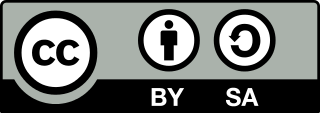
Subscribe here for monthly roundups and very occasional mid-month announcements
Upcoming public Agendashift workshops
USA * 2, Germany; with Mike Burrows unless otherwise stated:
29 March 2019, Seattle, WA, USA:
Facilitating Outcome-Oriented Change with Agendashift
(Core, 1-day workshop, Julia Wester )
16-17 May 2019, Boston, MA, USA:
Coaching and Leading Continuous Transformation
(Advanced, 2-day masterclass immediately following the Open Leadership Symposium )
22-23 May 2019, Berlin, Germany:
Coaching and Leading Continuous Transformation
(Advanced, 2-day workshop)
Also: Channel #agendashift-studio in the Agendashift Slack if interested in a cozy workshop with me at Agendashift HQ (Derbyshire, England).
[image error]Blog: Monthly roundups | Classic posts
Links: Home | About | Partners | Resources | Contact | Mike
Community: Slack | LinkedIn group | Twitter
We are champions and enablers of outcome-oriented change and continuous transformation. Building from agreement on outcomes, Agendashift facilitates rapid, experiment-based emergence of process, practice, and organisation. Instead of Lean and Agile by imposition – contradictory and ultimately self-defeating – we help you keep your business vision and transformation strategy aligned with and energised by a culture of meaningful participation. More…

